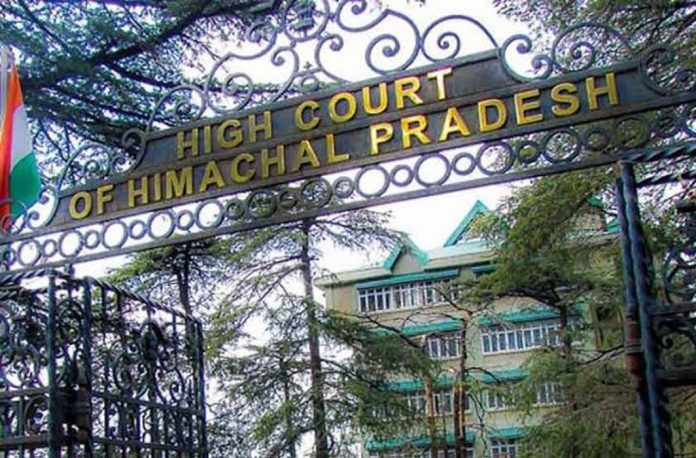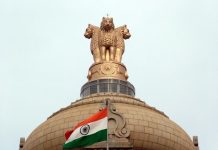This article is written by Shweta Kumar Devgan, Team LawSikho.
Table of Contents
A Career in Himachal Pradesh Judicial Services
“Laws are dead letter without courts to expound and define their true meaning and operation”- Alexander Hamilton
As law students and professionals our dream job comprises work that entails a sense of security, intellectual and social satisfaction, high self-esteem, work- personal life balance and most importantly a respectable position in the society. The charm of the job increases manifold when coupled with an environment that is free from both pollution and politics.
If you are a lawyer/law student with a passion to deliver justice to people both in mainstream society as well as the remote areas of this country, then appearing for the Himachal Pradesh Judicial Services Competitive Examination is a very bright option.

How to become a Judge in the State of Himachal Pradesh
Within the State of Himachal Pradesh, there are two ways through which one can become a Judge:
- The first is by appearing and getting selected for the lower judiciary competitive exam conducted on a regular basis by the Himachal Pradesh Public Service Commission and;
- Secondly, by appearing for an entry level competitive exam to the Higher Judicial Services after litigating for a minimum of 7 years.
The focus of this article shall be upon the lower judiciary services of Himachal Pradesh to make the candidates, who wish to appear, attain clarity about the exam in a holistic manner.
Frequency of occurrence of the exam
It is conducted yearly or twice a year depending upon the number of vacancies estimated by the High Court of Himachal Pradesh. The tentative dates for the preliminary exam tentatively fall between the months of February-March or August-September.
Number of seats
Being a small State, the vacancies in Himachal Pradesh are lesser in comparison to other States. However, with creation of adequate infrastructure as well as the impending need to finish the pendency of cases in judiciary; the urgent need to recruit more number of judges in subordinate judiciary is constantly being realised by the State High Court. Depending upon vacancy, the number of seats, each year varies between 2 to 10 for general category, whereas aggregate seats have so far varied between 4-15.

Eligibility criteria
The following essential qualifications must be met:
- The candidate must be a citizen of India.
- The candidate must be a holder of a degree in Law which is recognised by the Bar Council of India. (Please note that enrolment with the Bar as an Advocate is not a condition for appearing, however it is advisable to do so, on account of adding job experience at interview stage.)
- The minimum age prescribed is 22 years, while a candidate above 35 years shall be ineligible. However, the upper age limit is relaxable by 3 years for S.C. category candidates of Himachal Pradesh.
Mode of applying
Applications are received online. A candidate is required to register himself or herself as a ‘new user’ on the Himachal Pradesh Public Service Commission website (www.hppsc.hp.gov.in). Those who are already registered with the commission website are required to click on the ‘registered user’ link, available on the website.
The mode of fee payment is through e-payment i.e. through Debit Card, Credit Card and Net Banking (Rs. 400 for General Category and Rs. 100 for S.C. and Other Prescribed Reserved Category of H.P.).
Centres of Examination
Preliminary examination: Shimla, Mandi and Dharamshala
Mains and Interview: Shimla
Scheme of the Exam

The Preliminary paper consists of 3 papers of 100 Marks each:
- Civil Law I
- Civil Law II
- Civil Law III
Each paper is of one hour duration and the examination in all the 3 papers is held on the same day.
The result of the preliminary exam is declared within 20-25 days approximately and a candidate has approximately 30 days to prepare exclusively for the Mains exam after the preliminary exam.
For mains exam, each paper is of 3 hours duration.
Candidates, who qualify the mains examination, will be required to appear at such a place as fixed by the Commission for a viva-voce test. The maximum marks for the personality test will be 150.
Whereas the preliminary examination is qualificatory, marks obtained in the personality test will be added to the marks obtained in Mains written examination for purpose of selection of the candidates. A candidate shall be required to obtain atleast 45% of the marks allocated for the interview failing which he shall be deemed to have not qualified the competitive examination.
Syllabus
So far as Civil Law I, Civil Law II and Civil Law III are concerned, the syllabus for Preliminary and Mains examination are the same.
The subject and syllabus for main (narrative) examination and marks for each paper are as follows:
|
PAPER- I |
Civil Law I: Code of Civil Procedure, Indian Evidence Act, Indian Stamp Act, Himachal Pradesh Courts Act, 1976 and Specific Relief Act. |
200 Marks |
|
PAPER- II |
Civil Law II: Indian Contract Act, Hindu Law, Indian Limitation Act, Transfer of Property Act and H.P. Urban Rent Control Act. |
200 Marks |
|
PAPER- III |
Criminal Law: Indian Penal Code, Criminal Procedure Code, Chapter-XVII (Section 138 to 143) of the Negotiable Instruments Act, H.P. Excise Act-2011 ad applicable to the State of H.P., Wildlife Protection Act and Indian Forest Act. |
200 Marks |
|
PAPER- IV |
English Composition: A Choice from three Essays on General Subjects. ESSAY: 100 Marks Translation of Hindi Passage into English: 50 Marks |
Total: 150 Marks |
|
PAPER- V |
Language (Hindi): Hindi (in Devanagri Script) No books prescribed. The paper of Hindi will comprise of the following: Translation of English passage into Hindi: 30 Marks Essay in Hindi on any topic out of three: 50 Marks Composition (Idioms and Corrections etc): 20 Marks (The standard for the language paper shall be that of Matriculation examination) |
Total 100 Marks |
Please take note:
- For Mains examination no candidate shall be credited with any marks in any paper unless he/she obtains 40% marks in that paper, except Hindi language paper (paper- V) in which candidate should obtain at least 33% marks.
- A candidate in order to qualify for the Mains Examination must have obtained 45% marks in aggregate in all papers and at least 33% marks in Paper V.
Weightage of each subject and specific strategy
Preliminary Exam: The weightage for each subject differs from year to year. However, each year maximum questions have been asked from:
- C.P.C in Civil Law I
- Indian Contract Act and Transfer of Property Act in Civil Law II
- Cr.Pc and IPC in Criminal Law
However, ignoring the local laws of Himachal Pradesh is not at all a wise option as each mark counts and often questions from these laws decide the make or break for a candidate who is appearing for Prelims!
One must also take note of the fact that over the last 2 years there has been an increase in focus on the laws that are specific to Himachal Pradesh and the quality of questions in this area is constantly improving.
Another thing which is peculiar to HPJS Prelims is that a lot of questions are based on case laws, both latest and landmark. Thus if a candidate is specifically focusing on this exam he/she must keep a tab of the latest as well as old landmark case laws from all subjects.

Mains Exam
Each paper is divided into 2 parts. Whereas the first part is compulsory, 3 questions are to be attempted from the 2nd. Usually 5 questions are to be attempted, in all (though these instructions are subject to change and one must read the questions paper carefully to take a note of the same).
Other things to note
- In civil law I, the first question of Part A deals with drafting a plaint and written statement, as well as judgment writing based upon a fact situation.
- In the past, a good grasp over the Indian Evidence Act has proven to be advantageous to candidates who have appeared for the mains examination.
- A good knowledge of the laws specific to Himachal Pradesh such as the Himachal Pradesh Courts Act, H.P. Excise Act, Wildlife Protection Act etc gives an added advantage to a candidate in answer writing, as most of the answers are direct, thereby giving very little leeway to the paper checker to apply subjectivity.
- A lot of questions in the mains exam are repeated from the past year papers, thus a serious candidate cannot afford to sideline them while preparing.
- One must read the illustrations to the Sections of the Bare Act carefully as often questions are directly framed upon them. This stands particularly accurate for IPC, Transfer of Property Act, Indian Evidence Act and Indian Contract Act.
- Given a choice it is advisable for one to not attempt the questions on Negotiable Instruments Act in the mains exam, unless one is very thorough with the same.
Level of Competition
In the past mostly students who belonged to Himachal Pradesh were appearing for the exam, but with increasing awareness, constant improvements in the quality of legal education, greater access to quality content and a dearth of good jobs- the number of students who are appearing; from Himachal Pradesh as well as adjoining areas is on an exponential rise.
Thus, with a limited number of seats and more number of candidates filling the form, the level of competition is increasing manifold. Having said that one must still be conscious of the fact that the real competition is always between a few serious candidates who form the cream of any competitive exam, as luck on favours those who are willing to work hard!
Ideal time to start preparation
The sooner a student is able to realise his or her goal of becoming a judge, the better it is as it allows one to space out their preparation in a timed and planned manner and gives some scope for amending errors.
Since a thorough grasp of the Bare Act is very important in this exam, one must give themselves sufficient time to be able to read, be familiar with and revise the Bare Acts of all subjects at least thrice.
Keeping in mind the above-mentioned one year of serious and rigorous preparation is a sufficient time to prepare for HPJS Judiciary.
How to Prepare

The key mantra to crack HPJS exam is to ‘divide and learn and back it up with extensive revision.’ It is advisable to create a daily schedule and cover the entire syllabus in the limited time that one has.
Step by step guide to preparation
- First pick up the lengthy and relatively complex laws such as C.P.C and Cr.Pc.
- Give yourself a time frame of 3-5 months to cover them once.
- Cover the following laws together for a better understanding:
- C.P.C and Limitation Act
- Cr.Pc and Negotiable Instruments Act
- Contract Law and Specific Relief Act
- Transfer of Property Act and Hindu Law
- I.PC. and Indian Evidence Act
- Indian Forest Act and Wildlife Protection Act
- H.P. Courts Act, H.P. Excise Act and H.P. Urban Rent Control Act
- Whichever subject you choose to pick, first go through the past year papers of both prelims and mains to have an idea about the types of questions that have been asked.
- Since 90% of the preliminary exam comprises memory based questions, regular revision is extremely important.
- A scientific way to remember the relevant sections of the Bare Act is to acquire the skill of framing the questions from it. This skill comes once a student has acquired sufficient clarity over the provisions of the Bare Act.
- Create a specific set of notes which you can use for revision.
- With each revision, try to make your notes more concise so that last day revision is a cakewalk.
- Attempt atleast 10 Multiple Choice Questions from the topics that have been covered, daily.
- Once the major laws are completed, practice answer writing for questions that have been frequently asked. Answering 2 questions a day is suffice, but do it in a time bound manner so that your writing speed increases.
- The language paper is qualificatory but a lot of times becomes the Achilles heel and must not be ignored.
- Daily familiarisation with 10 new words from Hindi vocabulary is advisable along with revision of Hindi grammar and English essays after the preliminary exam.
- To write a good essay in English, read the editorial section of a Standard English newspaper such as the Hindu, Times of India or Indian Express.
- General knowledge and constitutional law, even though not a part of the preliminary and mains syllabus must be brushed well before the interview.
- Never forget- Consistency is the Key!
Mistakes to avoid while preparing
- The preparation for prelims and mains go hand in hand. Focusing too much on theory while keeping Multiple Choice Questions (MCQs) practice for the end is not the best approach.
- Not moving step by step: Some candidates start imagining themselves facing the interview board right from the first day of their preparation. While it is good to be aspirational and remain positive, one must never forget that their interview preparation would materialise only after clearing prelims and mains.
- Waste time in collecting and covering a lot of material when the key is to read and revise the same material again and again and never forget that most of the questions are framed directly from the Bare Act.
- Leaving the lengthy laws for the end.
- Ignoring past year papers or leaving them only for reference towards the end.
- Spending too much time in socialisation and discussion over the exam than actual studying.
- Lack of self-confidence or over-confidence: some students keep changing their places of coaching, thinking that a particular mentor will guide them better.
- Not giving enough time to self study: Daily 8 hours of coaching would materialise into nothing if you are not giving enough time to grasp all the content that a coaching centre has loaded you with.
SO BUCK UP!
AND
GET GOING!
ALL THE BEST!
LawSikho has created a telegram group for exchanging legal knowledge, referrals and various opportunities. You can click on this link and join:
https://t.me/joinchat/J_0YrBa4IBSHdpuTfQO_sA
Follow us on Instagram and subscribe to our YouTube channel for more amazing legal content.
 Serato DJ Crack 2025Serato DJ PRO Crack
Serato DJ Crack 2025Serato DJ PRO Crack










 Allow notifications
Allow notifications



[…] post Everything about Himachal Pradesh Judicial Services Competitive Examination appeared initially on iPleaders […]